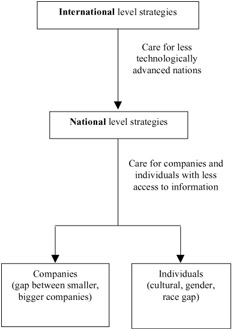The Future of it Diffusion: Stakeholder Consideration for the Elimination of the Digital Divide
The need to consider stakeholders in the implementation of technology diffusion strategies is obvious in policy documents, where the welfare of consumers, citizens and companies appear as the main aim of those strategies. For example, OECD's policy document about electronic commerce states (OECD, 1998): "It is recognized that OECD's work in electronic commerce should be carried out in a cooperative and complementary fashion with work under way in organizations, labor, and consumer organizations, social interests, and the private sector."
Additionally, in the report titled, "Joint EU-U.S. Statement on Electronic Commerce" (EU-U.S., 1997), published by a joint committee of American and European policy makers, the need for the consideration of the widest number stakeholders during the application of an electronic commerce diffusion strategy is explicit. It is stated that: "Global electronic commerce should take into account the interests of all stakeholders, in particular of consumers, libraries, schools, and other public institutions, as well as the need to ensure the widest possible use of new technologies."
Moreover, the European Union has launched an initiative called 'go-digital' that aims to promote electronic commerce to SMEs in each country-member to help them introduce electronic commerce to their business strategies. The Union acts as an international change agency that explicitly states its care for the entities in less advanced positions. The concern about the differences in the digitization level among country members and between members and candidate countries is apparent in official documents and reports. At a national level, member-states working to implement the go-digital initiative at a country level, support that the transfer of knowledge to less advanced rural areas of the country is one of their main objectives, as an effort to apply diffusion policies that eliminate inequalities within the country.
The examination of the above stakeholder interests show that policy makers express a normative interest of who needs to be considered when designing strategies for electronic commerce and information technology in general. The efforts for the minimization of the digital gap are consequently the result of the need to consider stakeholders in less advanced positions. As presented in Figure 1, the efforts are made at both national and international levels.

Figure 1: National and International Diffusion Policies for the Minimization of the Digital Gap
At the national level, the interest to consider stakeholders in less advanced positions is expressed by pursuing policies that eliminate the inequalities in terms of cultural, gender, and race gaps among individuals and between small and bigger companies. Change agencies acting at the national level are government authorities in cooperation with local and regional representatives. At an international level the interest of the policy makers is focused on offering equal opportunities to nations in different levels of economic development. International non-profit organizations are typically the change agencies that promote these policies in cooperation with the governments of their county-members.
Policy makers working at either a national or international level can benefit by considering the widest spectrum of stakeholders in the field. Thus they can identify the needs of less advanced groups of stakeholders and promote cooperation to support them. Cooperation at the international level helps change agencies at the national level (national government agents in their majority) to follow directives that incorporate the expertise of multiple national constituencies, which have been tested. The early Internet experience of high-digitized countries can benefit stakeholders acting as change agencies in countries at the initial stage of Internet adoption. It is important to learn from previous mistakes and best practices followed, in order to avoid the former and learn from the latter. The influence is in some cases mutual. National change agents may have the power to play a vital role in the definition of national standards, having strong influence on entities' international policy making in information technology diffusion. The definition of global strategies at a high policy level leads to a "chain reaction" when governments, by selecting the most efficient international directives, can advocate them to change agents that in return can apply effective diffusion mechanisms for individuals and companies.
EAN: 2147483647
Pages: 198